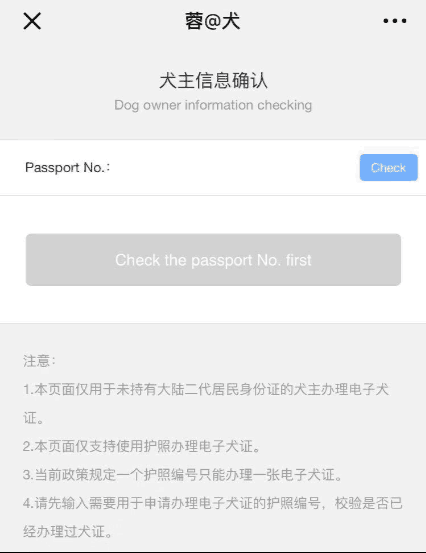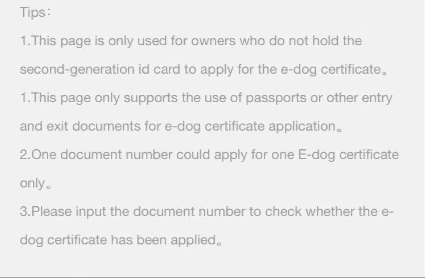Updated – 28.01.2019
Even if you just landed yesterday, you’re sure to have noticed the abundance of dogs trailing behind their owners. You may have even noticed that some breeds are more popular than others, it being highly rare to see something as ‘big’ as a Golden Retriever. This can be attributed to the ‘dangerous’ dog ban, as initially reported on. Other factors, such as small living spaces and limited time to exercise also weigh on breed choice, in China especially.
As far as we know the ‘dangerous’ breed ban is still in place, but there has been a major update to the registration process. Previously, only people holding a Chinese ID card were able to complete the registration process.
Foreigners, and your pups, rejoice! The system has been updated to allow people with foreign identification to register their dogs. Additionally, there has been an update on how to get your pet into China. The registration process is virtually the same as with a Chinese ID.
Dog Registration Steps:
Search for the official account “蓉城犬管” on WeChat. It’s a good idea to follow 蓉城犬管, so that you get the necessary updates.
2. Click “犬只管理” (dog management).
3. Click “在线办理” (online registration)
4. Click “Passport”. This is the screen that lets you input whether you’re a Chinese national or not. Here, foreigners click on the “Passport” option.
5. Fill in your own personal details as ‘dog owner’. Here you can fill out details of your ID, including uploading an image of yourself and copy of ID.
6. Fill in your dog’s details and upload your dog’s immunisation records.
And you’re set! It may take a couple days to go through, so don’t stress. In the meantime we still recommend following some of these tips that Ruby from Chengdu WFA (Welfare For Animals) gave us in the original article:
1) Ensure that your dogs have been fully vaccinated against Rabies, Canine Parvovirus and Canine Distemper as the law stipulated.
2) Speak to your veterinarian regarding any breed-specific concerns.
3) Carry your pet passport or pet registration card with you when you take your dog for a walk. Your veterinarian should supply you with a pet passport when you get their full vaccination series, which states their weight, breed and age.
4) Always walk your dog on a leash when outside, unless at an enclosed and designated dog park.
5) Take your dog for a long walk in the morning and evening and a brief walk during lunch.
6) Practice your SIT and Stays when people walk past your dog, to create good impressions and show people that you have a “good dog”.
7) Provide your dog with enrichment during their time in your home using stuffed KONGs, chew toys, calming music or DIY enrichment to prevent destructive behaviours from developing.
8) Take your dog to positive reinforcement force-free training classes with qualified and experienced trainers to prevent potential problems from occurring in the future.
Original Post
Starting from 16th November 2018, 22 ‘dangerous’ dog breeds are to be banned in 5 Chengdu districts. Official reports say the ‘containment and disposal of the banned dogs within the restricted areas, [will occur] in order to create a civilised and hygienic environment’. In addition, all pet owners must register their dogs – although this option isn’t currently available for foreigners.
List of banned breeds
Currently you are not able to register your dog personally if you don’t have a Chinese ID card – but Chinese friends or partners can do it in their name. A guide provided by GoChengduarticle to help you license your dog, says you can do so (with help of a Chinese friend) electronically on ‘蓉城犬管’. You need to provide: full vaccaintation certificates, a photo of your dog, your ID number, and a photo of yourself.
How to electronically register
Should you be concerned?
We do not know how harshly the rules will be enforced but there is no need to panic. Ruby from Chengdu based animal welfare, training and behaviour business WFA (Welfare For Animals) advises all concerned pet owners to do the following:
1) Ensure that your dogs have been fully vaccinated against Rabies, Canine Parvovirus and Canine Distemper as the law stipulated.
2) Speak to your veterinarian regarding any breed-specific concerns.
3) Add 蓉城犬管 pet registration contact card to keep informed.
4) Carry your pet passport on you at all times until the law is updated to allow for foreigner registration.
5) Carry your pet passport or pet registration card with you when you take your dog for a walk. Your veterinarian should supply you with a pet passport when you get their full vaccination series, which states their weight, breed and age.
6) Always walk your dog on a leash when outside, unless at an enclosed and designated dog park.
7) Take your dog for a long walk in the morning and evening and a brief walk during lunch.
8) Practice your SIT and Stays when people walk past your dog, to create good impressions and show people that you have a “good dog”.
9) Provide your dog with enrichment during their time in your home using stuffed KONGs, chew toys, calming music or DIY enrichment to prevent destructive behaviours from developing.
10) Take your dog to positive reinforcement force-free training classes with qualified and experienced trainers to prevent potential problems from occurring in the future.
The new rules also state that families can only keep one dog in any of the restricted areas. If a dog gives birth to puppies, you have 4 months to rehome them. Dogs must be kept on a leash outside and their waste must be dealt with by their owners.
This increase in city-wide dog bans has been linked to an incident in Hangzhou in which a man attacked a woman when she tried to kick his unleashed dog away from her child.
There are also fears that this will lead to owners abandoning their dogs and even increased violence towards them,as in Hangzhou, there has been a sudden and increased series of dog poisonings – try not to let your dog randomly eat off the ground.

Sources:
www.cdnews.org,
www.chinadaily.com










